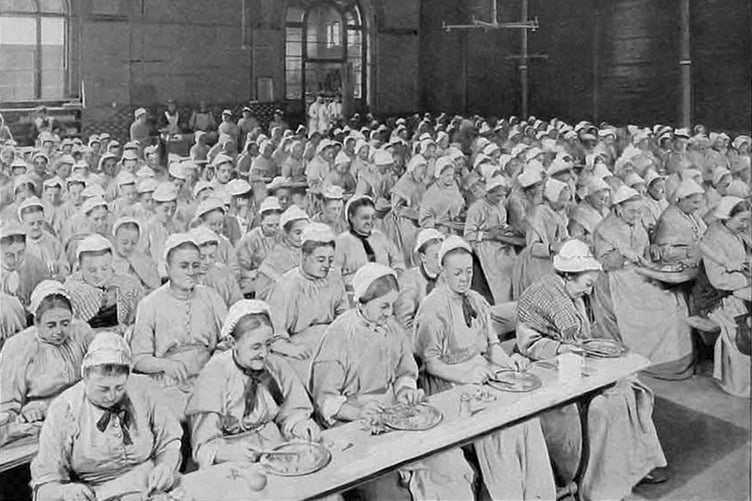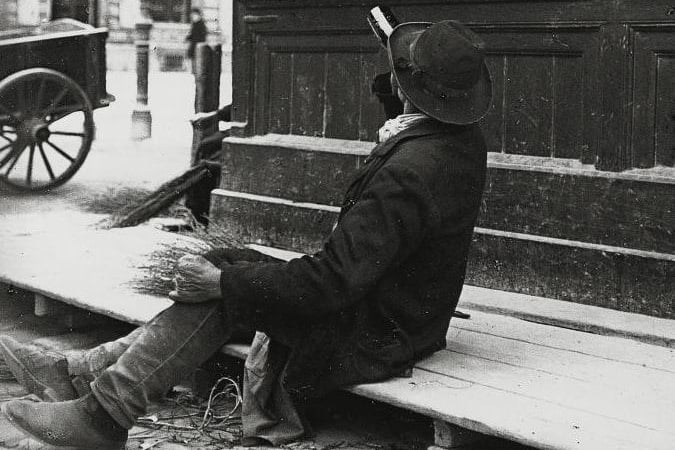LIKE many of his countrymen during the industrial revolution, Irishman Jeremiah Callaghan arrived in the Welsh Valleys looking for work at the coal face, the iron works or the quarry.
Jeremiah had a reputation as a brooding individual who was hard to handle and something of a ne-er-do-well. He had served in the army for a number of years and was known by the locals as ‘Jerry Canteen.’ Yet Jeremiah was neither disciplined nor governed by a strong work ethic. He was a work-shy soul who when not in his cups or looking for a scrap, was dodging steady employment like a bullet.
Yet, with a 38-year-old wife, Hannah Shea, a son, and three daughters living in the Bedwellty Union workhouse, the pressure was on Jeremiah to find a job and stick at it.
Being a labourer for a firm of local stonemasons wasn’t Jeremiah’s dream gig but he decided to make a go of it, save a few quid, and find some decent lodgings for himself and his family.
However, as he sweated, slaved, and saved, the green-eyed monster, which has been the ruin and rot of many a man, began to plague Jeremiah’s thoughts.
He began to grow increasingly paranoid that Hannah was taking what meagre earnings he had and blowing them on alcohol. He also began to cultivate a gnawing suspicion that she was sleeping with another fella.
Things came to a head on Saturday, October 4, 1902.
Along with her children and other friends, Hannah decided to leave the workhouse for a day and visit Tredegar. When Jeremiah got wind of this, he was keen to meet up with his kin, but things didn’t go to plan.
Hannah and the kids weren’t at the designated meeting point - the railway station, and this served to fan the flames of the hot-headed Irishman’s wrath.
With murder in his eyes and curses on his lips, Jeremiah took to the town like a vengeful god. He searched pub after pub looking for his wife and eventually found her sitting outside the Miner’s Inn with her children and a lady named Mrs. Prothero.
Jeremiah accused Hannah of being a slave to the bottle and wasting his hard-earned cash on booze. She flatly and fiercely denied this which proved to be the last straw for her husband. With a snarl and a sneer, he punched her to the pavement.
Picking herself up off the floor, a bruised and indignant Hannah gathered her children and marched up Church Street, away from her husband and his uncontrollable rage.
Yet Jeremiah was just warming up and followed hot on her heels.
Fortunately for Hannah, a member of the local constabulary appeared on the scene and warned Jeremiah to back off.
Not foolish, angry, or intoxicated enough to get into a beef with a strapping and no-nonsense policeman, the Irishman did as he was told and disappeared from sight.
As for Hannah, she and her children returned to the Miner’s Inn.
Later that afternoon Hannah and her children would accidentally bump into a now deeply-contrite Jeremiah in the town’s Circle where the iconic clock overlooks all and sundry.
Jeremiah apologised for letting the old familiar rage seize him in his grip and offered to buy Hannah a few rounds of drinks at The Black Prince as a way of apology.
Basking in the rosy glow of alcoholic numbness, Jeremiah and Hannah stumbled out of the pub in the fading light of a sunny Autumn afternoon with their children in tow.
Jeremiah who at this point was said to be falling down drunk had decided to escort his family back to the workhouse. Along the way, they met Hannah’s workhouse friend, Jane Hannam and the two women fell into chatting idly about nothing in particular.

As they gaily conversed and waltzed along the hillside an observant bystander would have noticed that Jeremiah had fallen into a heavy silence, oppressive and menacing in nature.
It was a loaded and ominous quiet that should have forewarned vigilant watchers of the storm and outburst to come.
Yet Hannah and Jane were neither vigilant nor watchful on that fateful afternoon, as whatever demons had been let loose to dance in Jeremiah’s soul and drink-addled brain began to have their wicked way.
Without warning, Jeremiah suddenly drew a knife from his pocket and screamed like a man possessed.
With a terrible symmetry of movement, he thrust his wife against a nearby wall with one hand as the one with the blade was viciously drawn across the poor woman’s throat.
Hannah screamed in an agonising fashion but somehow managed to break free of her husband's grip, and with the very life spilling out of her she fled down the hill.
Hannah’s young son, also named Jeremiah, began to scream and throw stones at his father.
With a knife in hand and a disturbingly vacant expression, Jeremiah began to walk in the direction of his sobbing children.
The approach of their murderous father and the disappearance of their wounded mother, who was still screaming in the distance, was too much for the youngsters to bear, and they took their terror and fled up the hill.
Meanwhile, in the opposite direction, Hannah lay in a pool of her own blood. Her cries had alerted the workhouse’s cleaner, Sarah Morris. Having rushed to her aid, Sarah cradled the dying woman in her lap as the blood continued to ooze from the jagged hole in her throat.
A collier named William Pritchard also arrived on the scene and attempted to prevent the precious blood from flowing out of Hannah by wrapping Sarah’s apron tight around the near-unconscious woman’s neck.
A district nurse named Amy Pearl and Dr. Isaac Crawford arrived and also determinedly struggled to keep Hannah alive as they waited for an ambulance.
Yet as her breathing became strained, and the space between each heartbeat grew longer, her will lost its focus and shape. Eventually, the wife of Jeremiah Callaghan could struggle no more and the light behind her eyes slowly faded. She died at precisely 6.45 pm.
As death and the night darkened the hillside, the cleaner, the collier, and the nurse picked up the lifeless body of the woman they could not save and carried her with a gentle and careful grace back to the nearby workhouse.

An eye-witness who had passed Jeremiah leaning like a three-day drunk against a stone wall had reported him to the Workhouse’s master, William Thomas.
The suspicious individual with heavily bloodstained sleeves, bloodshot eyes, and breath that stunk like a brewery had been brought to the workhouse for questioning and was on the premises when the corpse of his wife was taken to the mortuary.
Thomas informed Jeremiah of his wife’s death, to which he simply replied, “Can I see my children?”
The request was declined and as all present waited for the police to arrive, they were amazed to see the killer stumble out into the courtyard and jig and dance like a man intoxicated with all the joys of spring.
He appeared far removed from a man who had murdered his wife, orphaned his children, and who had condemned his body to the gallows and his soul to the dark corners of hell.
The police arrived to question Jeremiah but they could not make any sense out of his incoherent ramblings or depraved rantings.
They took him, threw him in a cell, and gave him a day to sober up and come to his senses. When sobriety had returned, Jeremiah appeared completely dumbfounded when told of his wife’s death.
He asked once again to see his children, who were residing back at the workhouse but was once again denied.
On October 7, 1902, under the watchful eye of James Berry Walford, an inquest was held and a jury didn’t hesitate to find Jeremiah guilty of wilful murder.
He was committed to trial at the Monmouth Assizes on November 22, 1902.
The court heard how an engine driver called Mr. John Williams had spotted Jeremiah on the hillside attempting to use little scraps of paper to wipe his wife’s blood off his hands.
When Mr. Justice Forbes called William Pritchard to the witness box he testified that he had seen Jeremiah, Hannah, and the four children on the day of the murder in Tredegar town, and Jeremiah was so drunk he was constantly falling into the gutter and could not seemingly walk without the aid of his wife.
Dr. Crawford, who was present when Hannah died, also performed her post-mortem and stated that the attack on her person was so savage that both her jugular and two other arteries had been slashed.
He also commented on a particularly nasty injury to the head, which was believed to have been where her husband had struck her earlier that day.
The final witness called by crown prosecutor Mr. JRV Marchant was Superintendent Francis Allen. The detective was the first policeman to arrive at the workhouse and recalled how his first impression of Jeremiah was a man puffing on his pipe without a care in the world.
Allan said he took a nonchalant Jeremiah by the arm and led him to a quiet place before charging him with murder. He stated that Jeremiah could only converse in slurred tones, and upon his person he found a knife which was still wet with the blood of his butchered spouse.
A further search of Jeremiah’s clothing revealed an empty bottle of Irish whiskey and a few shillings.
Allen also noticed with a growing disquiet the specks of blood on the backs of Jeremiah’s hands.
In defence, Mr. H Hardy was left floundering in the face of such overwhelming and substantial evidence, and so he decided the best ploy for his client was to cop an insanity plea.
He led with the argument that Jeremiah’s act of violence was caused by an attack of delirium tremens and suggested it was nothing more than a momentary outburst of insanity.
He argued in his closing speech, “If delirium tremens caused a degree of madness, even if only temporary, it relieved a prisoner from criminal responsibility.”
Usk prison surgeon Dr. D Boulton had already carried out a thorough examination of Jeremiah and it was his professional and considered opinion that mentally the accused was as fit as a fiddle. Watching a seemingly unrepentant Jeremiah chat, act, and conduct himself in the courtroom as if he was on some sort of jolly, the jury agreed, and within 35 minutes they returned a guilty verdict.
Mr. Justice Forbes gravely placed the black gap upon his head and ordered that justice on this occasion would only be satisfied if an eye was taken for an eye.
After delivering the death sentence the grave-faced judge solemnly told Jeremiah, “I don’t wish by any words of mine to aggravate the painful situation in which you stand, but from the circumstances under which you committed murder, I can hold out to you no hope of reprieve.” The execution date was set for Friday, December 12, 1902, and Jeremiah was taken down to await his date with the hangman.
Father and son team, William and John Billington arrived at Usk prison to do the dark deed.
The night before Jeremiah’s sleep had been broken and plagued by a nightmare of what had been and was to come. The morning of his death was as bleak and desolate as any to be found in the grimmest midwinter.
Jeremiah accepted his punishment and walked to the scaffold without a struggle.
Before the rope silenced him for eternity, Jeremiah cried out, “Holy Mother pray for me! Jesus help me!”
As death as in life, the welfare and forgiveness of his wife and children did not appear to concern him.





Comments
This article has no comments yet. Be the first to leave a comment.